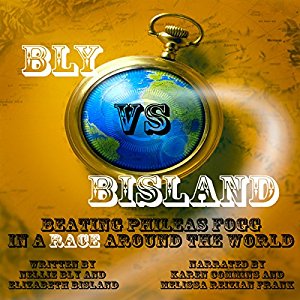After reading my article How I Started My Audiobook Publishing Company, a couple of people recently wrote to me with questions about the process. With their permission, I am answering their questions here so more people can benefit from and join in the discussion.
Before you read further, I should state that I’m not a lawyer. I offer advice based on my experience in the audiobook industry, but anyone considering starting a publishing company may need to consult with an attorney.


Telisha’s Questions:
1. Does ACX accept copyright audiobooks without the author’s consent in the example of an economy book that has been in publication for 20 years and has a new edition every year which comes out and has never had an audio version. I would love to do it. From reading your article, I would hate to have this idea usurped as the authors did in your experience.
In order to publish an audiobook, the text must either be in the public domain, or you must have the audio rights to publish it. Authors own the audio rights to their work unless and until they assign the rights to another party. Many publishers include audio rights as part of a publishing contract for the work.
This chart shows you copyright term and the public domain in the US. The terms vary for other countries; for example, this page has info about copyright in the UK.
If the work is in the public domain, anyone can use it for whatever purpose they like. As an example, I discovered 2 related books were in the public domain, and neither had ever been recorded. I edited both books together so they followed a consistent timeline. The result was an original, derivative work for which I now hold the copyright: Bly vs Bisland: Beating Phileas Fogg in a Race Around The World. I created the Kindle book and produced and co-narrated the audiobook.


If the copyright is still valid on the book, you must do research to determine who holds the audio rights. It could be the author, the author’s literary agent, or a traditional publisher.
When using ACX.com to distribute the audiobook, you must first be able to claim an edition on Amazon. It doesn’t matter whether the edition is Kindle, paperback, or hardback. My article linked above gives the steps and additional info about claiming the Amazon edition when you are using a text in the public domain. The ACX process is much simpler for claiming titles still in copyright and would start with step 6 and skip step 7 in my article.
Not knowing or being able to find the rights holder does not give one permission to record and publish the audiobook! Copyright infringement can be a serious and costly mistake.
Which leads us to the next question…
2. How do you find out who holds the Rights on a book currently in print? Can you negotiate to buy the audio rights? Is there a better way to buy the audio rights to a book currently in print?
The research on rights can start with how the book came to your attention. If you know the author, you can ask her whether she still has the audio rights to a book.
If the work is traditionally published, you can contact the Subsidiary Rights department of the publisher. You may need to become a detective following the links in this article and/or hire a researcher.
Once you find the rights holder, you can negotiate with that party to license the audio rights.
In August 2016, I hosted a webinar with Jessica Kaye, a Grammy-winning audiobook producer/director of over 500 titles, founder of long-time audiobook distributor Big Happy Family Audio, and intellectual property attorney at Kaye & Mills. Before the webinar, I compiled a list of links to aid in researching the rights holder and distributing the finished audiobook. In the 1.5 hours of the webinar, I asked Jessica how to structure the deal and specific questions about the budget for licensing. You can buy a copy of the recording and receive my exclusive list of links for $49 on my Shop page.
3. What production and payment options did you choose and why? I read up on the ACX website, but wanted to get your perspective as a seasoned business owner and narrator.
ACX forces one to select non-exclusive distribution when publishing an audiobook from a public domain text. The royalty rate is currently 25% of earnings, paid each month.
With Bly vs Bisland, I could have chosen exclusive distribution since it is an original work. Exclusive distribution gives you a 40% royalty rate, but you’re only allowed to sell the book on Audible, Amazon, and iTunes throughout the contract period. I chose non-exclusive distribution for it as well since I’d also like it to be available in libraries and places like the NY Historical Society Museum.
I’m currently producing and narrating a text for which I negotiated and licensed the audio rights. I haven’t decided if I want to distribute through ACX or another venue. If I do go through ACX, I’m leaning toward exclusive distribution for the first year to maximize the royalties paid. Like print editions, the interest in an audiobook is highest during its first year.
After the first year, section 12(A) of the ACX Book Posting Agreement states that you can write to Audible to request a change to non-exclusive distribution for titles produced under the pay-for-production model. The distribution cannot be changed for books created under a royalty share (RS) contract. As both the audio rights holder and narrator, I wouldn’t enter into an RS agreement with myself. 🙂
4. What was your starting out per-finished hour rate?
I’m assuming this question refers to my rate as an audiobook narrator. I completed my first audiobook for a commercial publisher in 2003. My rate was $60 per finished hour, which included editing and mastering the audio files to be retail-ready and transmitting them via DAT.
To learn more about building skills in becoming an audiobook narrator, check out this article. You’ll find more advice specific to being a producer on ACX at this link.
Adrian’s Questions:
5. I just finished recording an audio version of a copyrighted book that the author himself narrated and a friend of mine suggested that I start my own publishing company. I’m confused since the agreement with the author of the book was that we will publish the audiobook thru ACX and he will receive all the royalties. But now I wonder if I should use this opportunity and offer him to publish the book thru my publishing company that I want to start. Obviously all the profit on his book will be completely his.
Can you give some advice or thought on that?
Adrian clarified for me that:
- he had been the sound engineer in a work-for-hire arrangement with the author
- the author had paid him the agreed-upon fee
- he had created an ACX account for the author to upload the files
In this instance, you have no choice but to give the author the audio files per your agreement with him. For instance, the agreement may state that you will provide the edited, mastered, retail-ready, finished product. Withholding the files definitely is a breach of contract. I also would think attempts to re-negotiate the terms of the agreement at this point violate the spirit of the agreement and could jeopardize your long-term reputation.
Assuming that the file upload wasn’t included in your contract, you could offer to upload the files to the author’s ACX account as a convenience to that person and for an additional fee. The audio rights to the work, the audio files, and the ACX account all belong to the author.
Offering the author the chance to “publish through your company” doesn’t get the author anything, and, in fact, would cost the author more because you presumably would take a commission from the royalties. Otherwise, how would you make money from this venture?
The 3 easiest ways that you could start a publishing company are:
- following the steps in my article to produce works in the public domain
- acquiring the audio rights to books as discussed in questions 1 and 2 above
- becoming an agent for authors who don’t want to or have time to do the casting, production, and technical aspects like uploading files, and/or for those who want to use ACX but live outside the US, UK, Canada, or Ireland.
In your position as sound engineer, option 3 seems like the best route for you. You would need to outline the services covered in your fee to potential clients BEFORE you sign an agreement.
You would need to cast qualified narrators since authors usually are not the best oral interpreters of their text. You could use the talent pool on ACX for casting. You could also use ACX for distribution or another service. You would make these kinds of decisions when developing your business plan.
As the audio publisher, you’re also responsible for marketing the audiobook, starting with its cover art. Many times, the audio publisher cannot license the cover art to the print editions and must create or obtain new artwork for the audio.
6. If I want to start a publishing company is it enough to make a ACX publishing account or do I need to register it somewhere else?
ACX is merely a distribution option in audiobook production. You would still need to follow rules in your state, county, and city about starting a business. You may be required to get a business license and/or file other paperwork. You also need to talk with your tax advisor about the type of business you’d run (sole proprietor, LLC, etc.), which would dictate how you’d report the taxes on the income from it.
*****
When I worked at the government, I taught many training classes. I always liked to end with this quote:
We have not succeeded in answering all our problems.
The answers we have found only serve to raise a whole set of new questions.
In some ways we feel we are as confused as ever,
but we believe we are confused on a much higher level, and about more important things. 🙂
Obviously, we’ve just scratched the surface about considerations in audiobook publishing! If you have questions, please leave a comment, or contact me on my Shop page to set up a 30- or 60-minute personal consultation.
Updated 7/9/19
I live in India and I see a huge potential. I want to make a beginning as a narrator. Just to add I am an avid listener of audio books and have been listening to them for many years now.
Hi, Vivek! Thanks for the note. While most of my audience is in the US, the steps to become a narrator seem to be universal. This post may help you get started:
http://www.karencommins.com/2014/09/how-to-become-an-audiobook-narrator.html
Also, you’re right about the huge potential of audiobooks in India. In fact, articles like this one show the audiobook market there is expanding. In addition to US publishers, you can do research to find Indian audiobook production companies who accept demos from narrators.
I hope this info is helpful. Best wishes for your success!
Karen